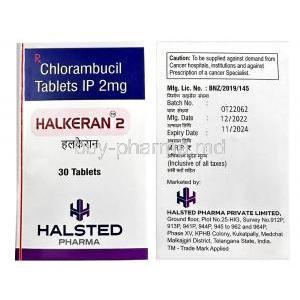Melphalan
Uses
How it Works
Common Side effects
Stomatitis,
Anemia,
Hair loss,
Reduced blood platelets,
Vomiting,
Diarrhoea,
Decreased white blood cell count
Storage
Introduction
Alkeran (Melphalan) tablets belong to a class of drugs called alkylating agents, often used for the treatment of various types of cancer. These are a class of cell-cycle non-specific agents which halt the cell division of rapidly proliferating cancerous cells in the resting phase.
Use
It has anti-neoplastic or cytotoxic properties due to which it is used as a chemotherapy drug in the treatment of cancers, like breast cancer, ovarian cancer, neuroblastoma, multiple myeloma, melanoma, retinoblastoma, hepatocellular cancer, etc. It works on the principle of interstrand crosslinking of the DNA chains, thereby halting the cell division of cancer cells.
Dosage and administration
For multiple myeloma:
The usual prescribed dose is 6 mg/day (3 divided doses of 2 mg each throughout the day) that is to be taken on an empty stomach, for 2-3 weeks, after which the drug must be discontinued for a period of 4 weeks, during which the cell count must be observed carefully. A maintenance dose of 2 mg/day can be instituted if the blood cell count is found to rise.
For ovarian cancer:
Administer a dose of 0.2 mg/kg body weight daily for a course of 5 days. Repeat the course after discontinuing the medicine for 4-5 weeks.
Warning
Any history of blood borne disorders or liver disease, or a history of cancer must be told to your doctor before being prescribed this drug. Also, if you are allergic to the drug or to any other substances, inform the doctor as well.
Do not take aspirin or any blood-thinners unless advised by your doctor. Do not go for any vaccination before consulting with your doctor.
This medication is harmful for the fetus hence it is necessary to take birth control measures if you are using this drug. It is also not indicated for nursing mothers.
Bone marrow suppression is a major side effect of this drug hence regular blood test for cell count must be conducted, and depending on the results, the dose of the drug will be adjusted accordingly.
In case of any symptoms like unusual weakness, black stool, dark urine, secondary lumps of tissue under the skin, hypersensitivity reactions like difficulty in breathing, skin rashes or swelling, etc., discontinue the drug intake and contact your doctor immediately.
Side effects
Nausea
Vomiting
Diarrhea
Hepatitis and jaundice
Bone marrow suppression leading to anemia, leucopenia, or thrombocytopenia
Fever with chills
Headaches and prolonged fatigue
Hair loss
Secondary malignancy
Pale colored skin
Rashes
Dark urine
Infertility or difficulty to conceive a child









